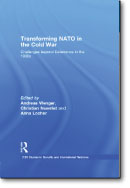Transforming NATO in the Cold War

Challenges beyond Deterrence in the 1960s
Author(s): Andreas Wenger, Christian Nünlist, Anna Locher, Erin Mahan, Jeremi Suri, Giles Scott-Smith, Thomas Gijswijt, Holger Nehring, Andrew Priest, Oliver Bange, Jonathan Søborg Agger, Leopoldo Nuti
Editor(s): Andreas Wenger, Christian Nünlist, Anna Locher
Series: CSS Studies in Security and International Relations
Publisher(s): Routledge
Publication Place: London, New York
